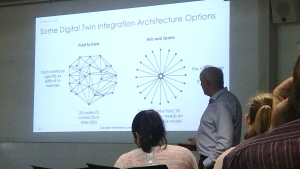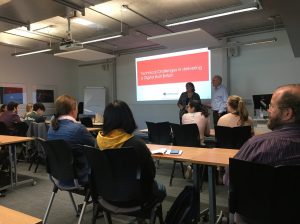Technical Challenges in delivering a Digital Built Britain | Dr Matthew West
Dr Matthew West has spent the majority of his working life at the petrochemical giant Royal Dutch Shell. From the early 1990s onwards he was involved in developing company standards and guidelines to support the integration of systems and processes to facilitate different parts of the multinational working efficiently and effectively together. Essentially this work involved the development of company-wide and eventually industry-wide ISO engineering standards. Creating shared standards involved engagement in many aspects of information management: information quality, modelling ontology, master and reference data. This lifetime of experience in developing systems that ensure information flows are efficient, accurate and timely has led to Matthew being an authority in this area of planning.
Today Matthew works as an independent consultant and partner at Information Junction Ltd. His work includes advising the Digital Built Britain venture. Digital Built Britain has been an ongoing project to access and share digital data about the UK’s built environment infrastructure. In 2017 the Centre for Digital Built Britain (CDBB) was established as a partnership between the Department of Business, Energy & Industrial Strategy and the University of Cambridge. The CDBB is interdisciplinary by nature and not simply a technical programme. It is bringing together industry, academia, and policy makers in order to consider “the wider effects of the digital agenda on society and the economy”. Within the CDBB there is a Digital Framework Task Group who are acting as national champions and Matthew West today is one of these.
We are becoming accustomed to the concept of digital twins. With humans, it is a data mod el of ourselves which may contain information about our academic qualifications, medical records, financial history and consequently our credit worthiness. Our digital twin provides essential information about us, which is useful to those who care, support or seek to sell to us.
el of ourselves which may contain information about our academic qualifications, medical records, financial history and consequently our credit worthiness. Our digital twin provides essential information about us, which is useful to those who care, support or seek to sell to us.
Within Matthew’s work, the concept of a digital twin is transplanted into the built and natural environment. This is potentially a huge undertaking; developing processes that allows digital data about buildings and the urban environment to be accessed from across the country despite being held by a multitude of different hosts. Y et the need is becoming increasingly apparent. Following the Grenfell Tower fire disaster in 2017, it took the government three months to answer the most obvious question ‘how many other residential towers have similar cladding?’ The information existed, in a variety of forms; electronic, pdf and paper format; at a range of locations; local authorities, building construction companies and facility management organisations, which is why it took over 90 days to determine the scope of the problem going forward. Matthew’s work then is to support the development of a unified information-sharing infrastructure, which will support all sorts of national planning, modelling and disaster preparedness programmes.
et the need is becoming increasingly apparent. Following the Grenfell Tower fire disaster in 2017, it took the government three months to answer the most obvious question ‘how many other residential towers have similar cladding?’ The information existed, in a variety of forms; electronic, pdf and paper format; at a range of locations; local authorities, building construction companies and facility management organisations, which is why it took over 90 days to determine the scope of the problem going forward. Matthew’s work then is to support the development of a unified information-sharing infrastructure, which will support all sorts of national planning, modelling and disaster preparedness programmes.
Trying to encourage disparate organisations share information is a challenge and Matthew has developed models to support the work. He demonstrated a couple of digital twins integration architectural models. A point to point model may appear fluid but in practice it quickly becomes unwieldy and changes to one part of the network have impacts across the whole network. Change therefore is expensive and may be resisted by parts of the network. Rather better is a ‘hub and spoke’ model where the information can be taken from any source and as long as the hub is sufficiently well engineered, amendments are done on a single node basis. The ‘hub and spoke’ model is much easier to manage and to adapt to changes.
In her vote of thanks for the seminar, Professor Dame Wendy Hall indicated that ECS is looking to work with Matthew West to develop work in this area. She commented that ECS not only has a proud history of interdisciplinary work, it also has the strength to emphasise not just the technical aspects but equally importantly the social aspects of developing a Digital Built Britain.
to work with Matthew West to develop work in this area. She commented that ECS not only has a proud history of interdisciplinary work, it also has the strength to emphasise not just the technical aspects but equally importantly the social aspects of developing a Digital Built Britain.
Ian Coombs
